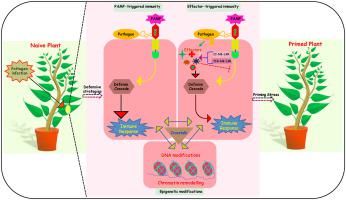当前位置:
X-MOL 学术
›
Physiol. Mol. Plant Pathol.
›
论文详情
Our official English website, www.x-mol.net, welcomes your feedback! (Note: you will need to create a separate account there.)
Insights to Plant Immunity: Defense Signaling to Epigenetics
Physiological and Molecular Plant Pathology ( IF 2.7 ) Pub Date : 2021-01-01 , DOI: 10.1016/j.pmpp.2020.101568 Gagan Kumar Panigrahi , Annapurna Sahoo , Kunja Bihari Satapathy
Physiological and Molecular Plant Pathology ( IF 2.7 ) Pub Date : 2021-01-01 , DOI: 10.1016/j.pmpp.2020.101568 Gagan Kumar Panigrahi , Annapurna Sahoo , Kunja Bihari Satapathy

|
Abstract Plants being sessile must incessantly integrate environmental stimulus and must be equipped with mechanisms which would enable them to differentiate potential harmless and harmful signals that they encounter. The coevolving nature of plant-pathogen interaction, has led the plants to evolve with array of adaptive mechanisms that contribute to basal immune defensive measures to battle against the incoming pests, pathogens and any other plant diseases. Specific plant recognition patterns empower them to perceive the invading microbial pathogens and subsequent defense response is elicited. The defense signal responses are partitioned both locally and systematically as the plant immune system are devoid of circulating immune cells such as macrophages and antibodies. This makes plants to evolve with highly complex and regulated mechanisms not only to counteract the pathogens but also to transmit the information to their next generation, known as priming. There is raising evidence justifying the role of epigenetic regulations in plant immunity, primarily its impact on developing immunogenic memory. Recent studies illustrate the involvement of epigenomic mechanisms such as DNA and histone modifications in fine-tuning the expression of immune-related genes. The dichotomy between epigenomics and plant immunity still remains blurred. Revealing the underlying molecular mechanisms and the role of epigenetics in plant disease resistance will aid in establishing efficient control measures against plant diseases and may result in improvised agricultural turnover. Here, we laid down the general concepts of plant immunity and epigenomic priming.
中文翻译:

对植物免疫的洞察:表观遗传学的防御信号
摘要 固着植物必须不断地整合环境刺激,并且必须配备使它们能够区分它们遇到的潜在无害和有害信号的机制。植物-病原体相互作用的共同进化性质导致植物进化出一系列适应性机制,这些适应性机制有助于基础免疫防御措施,以对抗传入的害虫、病原体和任何其他植物病害。特定的植物识别模式使他们能够感知入侵的微生物病原体,并引发随后的防御反应。由于植物免疫系统缺乏循环免疫细胞(如巨噬细胞和抗体),因此防御信号反应在局部和系统上进行了划分。这使得植物以高度复杂和受调控的机制进化,不仅可以抵抗病原体,而且还可以将信息传递给下一代,称为启动。越来越多的证据证明表观遗传调控在植物免疫中的作用,主要是它对发展免疫原性记忆的影响。最近的研究表明表观基因组机制(如 DNA 和组蛋白修饰)参与了免疫相关基因表达的微调。表观基因组学和植物免疫之间的二分法仍然模糊不清。揭示潜在的分子机制和表观遗传学在植物抗病性中的作用将有助于建立有效的植物病害控制措施,并可能导致即兴农业周转。这里,
更新日期:2021-01-01
中文翻译:

对植物免疫的洞察:表观遗传学的防御信号
摘要 固着植物必须不断地整合环境刺激,并且必须配备使它们能够区分它们遇到的潜在无害和有害信号的机制。植物-病原体相互作用的共同进化性质导致植物进化出一系列适应性机制,这些适应性机制有助于基础免疫防御措施,以对抗传入的害虫、病原体和任何其他植物病害。特定的植物识别模式使他们能够感知入侵的微生物病原体,并引发随后的防御反应。由于植物免疫系统缺乏循环免疫细胞(如巨噬细胞和抗体),因此防御信号反应在局部和系统上进行了划分。这使得植物以高度复杂和受调控的机制进化,不仅可以抵抗病原体,而且还可以将信息传递给下一代,称为启动。越来越多的证据证明表观遗传调控在植物免疫中的作用,主要是它对发展免疫原性记忆的影响。最近的研究表明表观基因组机制(如 DNA 和组蛋白修饰)参与了免疫相关基因表达的微调。表观基因组学和植物免疫之间的二分法仍然模糊不清。揭示潜在的分子机制和表观遗传学在植物抗病性中的作用将有助于建立有效的植物病害控制措施,并可能导致即兴农业周转。这里,


























 京公网安备 11010802027423号
京公网安备 11010802027423号